Welcome to the weekend edition of The Experiment, your official hopepunk newsletter. If you’d like to support my work, become a paid subscriber or check out the options below. But even if you don’t, this bugga free. Thanks for reading!
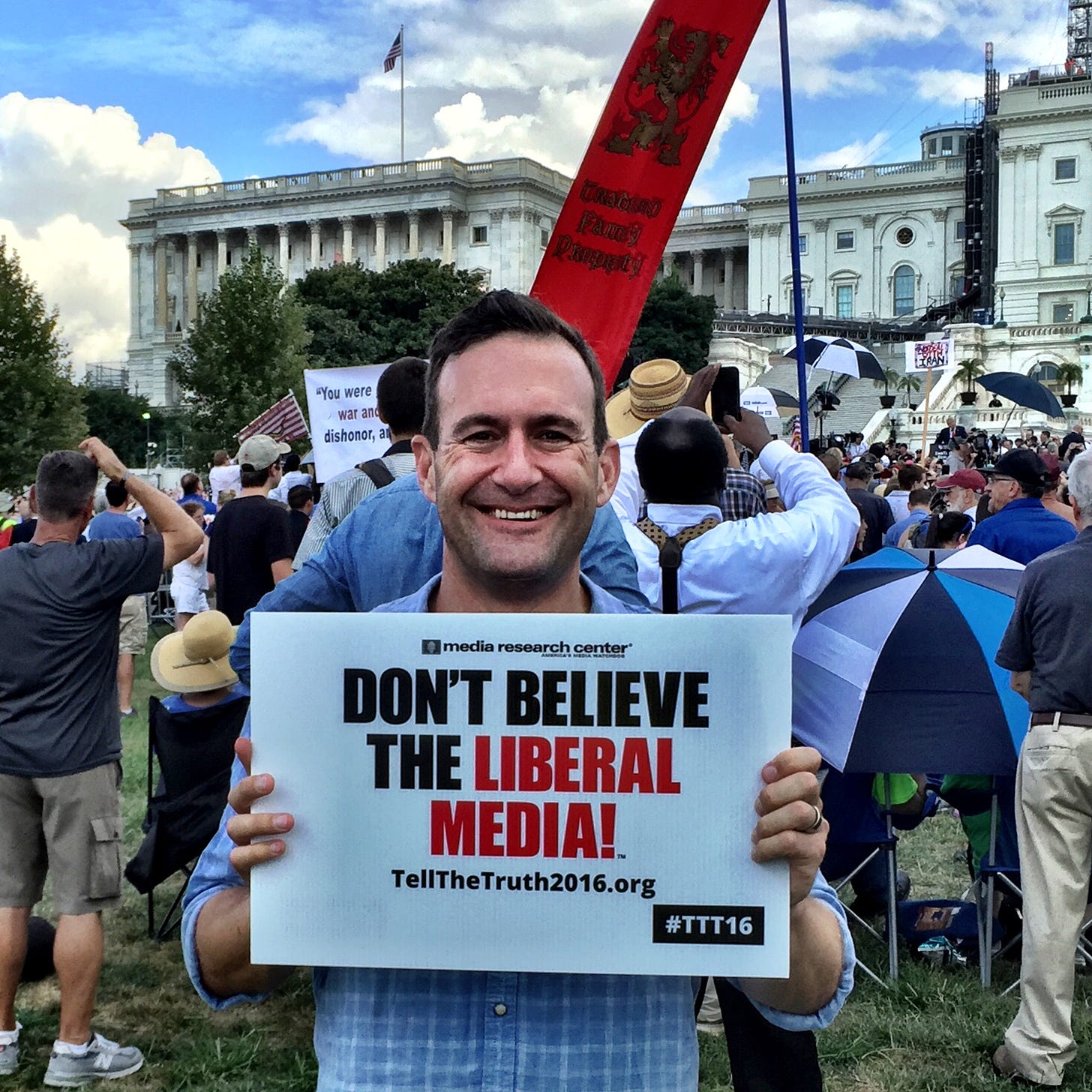
I saw Donald Trump on a lark, and as one. On an assignment to cover the Stop the Iran Deal Rally at the U.S. Capitol in Sep. 2015, I didn’t take the bad-faith critics of Barack Obama’s deal to stop Iran’s nuclear program seriously because there is only so much respect you can pay to an event headlined by Ted Cruz, the guy from Duck Dynasty, and Sarah Palin, who told two penis jokes aimed at Obama. And their performative jibes landed about how you’d expect. The crowd supplied applause when expected but withheld their hearts.
I felt this change when Donald Trump spoke. He talked with them, not to them, as if he were in conversation about how bad Obama’s Iran deal was. “We’re gonna do, and we’re gonna get, nothing. Nothing. We are led by very, very stupid people. Very, very stupid people,” he said, and instead of applauding dutifully they murmured in agreement.
“We are led by very, very stupid people. Very, very stupid people.”
He was running for president, but I didn’t take him seriously as a politician. He was a reality game show host to me, and even so I could tell that he could connect with the audience in a way Cruz et al could never. He was absolutely at home in his dealmaking persona, and the crowd, sensing this, relaxed. He had them.
And instead of understanding what I witnessed, I spent the next decade unlearning anything from that day that could have helped me understand what was happening. Instead, I moved back to Texas where I fell into a career of being the guy behind the guy who’s in the room where it happens. And in those rooms, Trump is an aberration from the norm. In those rooms, Trump is a joke.
I was not alone in this. Yale history professor Timothy Snyder, the “Do not obey in advance” guy who wrote On Tyranny: Twenty Lessons from the Twentieth Century, specializes in the history of Central and Eastern Europe, the Soviet Union, and the Holocaust. Sadly, this makes him well-suited for these times.
He doesn’t come to his assessment of Trump as a fascist from a partisan or leftist perspective. His life’s work has been to study autocrats and the damage they’ve caused, and he opens a recent New Yorker piece by neatly summarizing how we all—or most of us, anyway—were misunderstanding Trump even though he was being himself out in the noon day’s sun all along.
It was wrong to treat Donald Trump as a series of absences. The standard critique has always been that he lacks something that we imagine to be a prerequisite for high office: breeding, or grammar, or diplomacy, or business acumen, or love of country. And he does lack all those things, as well as pretty much any conventional bourgeois virtue you can name.
Trump’s skills and talents go unrecognized when we see him as a conventional candidate—a person who seeks to explain policies that might improve lives, or who works to create the appearance of empathy. Yet this is our shortcoming more than his. Trump has always been a presence, not an absence: the presence of fascism.
To Synder’s fascism, I would add another label, this one native to the United States: celebrity.
In an industry populated by sweaty politicians begging to get on television where they spoke as if they learned English in law school, Trump stood out. He’d been in our living rooms since 2004 when the producers of The Apprentice cast the bankrupt real estate developer who’d squandered his inheritance as a self-made billionaire. The show was a hit, seen by an average of 20 million viewers a week and occasionally topping the Nielsen ratings. As we shifted from an Information Economy to an Attention Economy, Trump showed up with his pockets stuffed full of the most valuable commodity of all: eyeballs.
In an age when growing up to be famous was a career goal, Trump looked successful because he was famous.
This legitimized him to exactly those Americans who people like me talk down to. To them, he was the self-made billionaire, a leader of men who was so powerful he could boss other celebrities around. In an age when growing up to be famous was a career goal, Trump looked successful because he was famous, and in fact it was because he was famous that he in turn became legitimately wealthy again by laundering his fame through licensing deals.
To us, though, he looked ridiculous, and the very idea that he was pushing the birther smear in and of itself delegitimized the attack. His chocolate in our peanut butter? The very thought! When Obama made sport of Trump at the 2011 White House Correspondents’ Dinner, it appeared that Obama had not only done away with the birther conspiracy theory but any possibility that Trump could ever get involved in politics.
Donald Trump is here tonight! (Laughter and applause.) Now, I know that he’s taken some flak lately, but no one is happier, no one is prouder to put this birth certificate matter to rest than the Donald. (Laughter.) And that’s because he can finally get back to focusing on the issues that matter –- like, did we fake the moon landing? (Laughter.) What really happened in Roswell? (Laughter.) And where are Biggie and Tupac? (Laughter and applause.)
But all kidding aside, obviously, we all know about your credentials and breadth of experience. (Laughter.) For example -- no, seriously, just recently, in an episode of Celebrity Apprentice -- (laughter) -- at the steakhouse, the men’s cooking team cooking did not impress the judges from Omaha Steaks. And there was a lot of blame to go around. But you, Mr. Trump, recognized that the real problem was a lack of leadership. And so ultimately, you didn’t blame Lil’ Jon or Meatloaf. (Laughter.) You fired Gary Busey. (Laughter.) And these are the kind of decisions that would keep me up at night. (Laughter and applause.) Well handled, sir. (Laughter.) Well handled.
In debriefing after the election, my oldest son Henry said something that I’ve been struggling to understand and the catalyst for this essay. “I think we lost this election 20 years ago,” he said.
Henry wasn’t talking about The Apprentice, which debuted its rehabilitation of Trump two decades ago. He was talking about a cinematic span populated by Michael Bay’s Transformers franchise, Hellboy, and the Watchmen, all telling stories of malign governments concealing truths and propagating lies and violence upon a powerless people.1 His generation—admittedly, he’s talking mostly about the straight males of his age—has been raised to be receptive to deranged, anti-establishment conspiracy theories. It’s like the culture was slow-walking them to Trump.
What stories should I have expected instead? Henry was learning to crawl on 9/11 and in diapers when we invaded Iraq. The day after Sandy Hook I walked him and his brother to school, and they didn’t need to be told why there was a police cruiser parked out front. Their generation grew up during the Great Recession but was more stressed about school shootings than about money. There were several hundred-year floods and fires, more police shootings that anyone can remember, and a worldwide plague that occasioned some pretty childish behavior on the adults’ part. Tell me how Trump is an aberration again? In their lifetimes, he’s ordinary.
“Politics is downstream from culture”
Rightwing journalist Andrew Breitbart likes to say “politics is downstream from culture,” meaning that if you want to change politics you first have to change the culture. That’s why they created and enthusiastically fund the bro-esphere. And, you know, good on them. They’ve created an echo chamber impervious to inconvenient truths.
An unexplored corollary to the Breitbart Doctrine is that the culture can be trying to tell us what is going to happen. Recently I wrote about how horror movies with traumatic birthing scenes reflected anxiety about rising maternal mortality rates and abortion bans. In the past I’ve found myself unintentionally binging on stories about underground resistance during fascist occupations. What could my subconscious possibly have been trying to get me to notice? And five years ago, I wrote my first hopepunk essay that drew from the experience of reading the Harry Potter novels to my sons, unknowingly preparing them for a future dystopia.
The movies Henry listed meant next-to-nothing to me. Watchmen, for example, never resonated with me, unreceptive as I am to an anti-government message. I believe that government can be a force for good because I have worked for the government and have done good. I have a network of friends and colleagues who have done far more and far greater things than I have helped do. I am in awe of their characters and capabilities, and when I think of the status quo I think of us, and so I was blind to the cultural conversation that delegitimized government.
“To see what is in front of one's nose needs a constant struggle.”
Henry didn’t include Stranger Things and Jordan Peele’s Us, both of which featured ugly, hidden realities just underfoot. In Netflix’s Stranger Things, the Upside Down was a supernatural evil hidden underneath reality. Likewise, Peele’s 2019 film featured our abused doubles living a nightmare under our feet. The trouble always starts when we see the horror that’s been concealed from us the whole time.2
But has it really been concealed from us? “To see what is in front of one’s nose needs a constant struggle,” wrote George Orwell. If you’re wondering why we’ve quoted Orwell two weeks in a row, it’s because he makes it easier to see now. I still want no part of the autopsy and recriminations of the Democratic Party. What Trump is doing at full speed and in public is going to run us over if we’re not paying close attention.
We’re going to have to get good at seeing what is going on and believing that it is really happening, even if it contradicts our notions of what is legitimate or worthy of attention. Right now, seeing what is right in front of our faces is our struggle, and it starts with accepting that Trump is exactly what he seems. He is a perfectly ordinary fascist.
Jason Stanford is a co-author of NYT-best selling Forget the Alamo: The Rise and Fall of an American Myth. His bylines have appeared in the Washington Post, Time, and Texas Monthly, among others. Follow him on Threads at @jasonstanford, or email him at jason31170@gmail.com.
Further Reading
We set up a merch table in the back where you can get T-shirts, coffee mugs, and even tote bags now. Show the world that you’re part of The Experiment.
Buy the book Texas Lt. Gov. Dan Patrick banned from the Bullock Texas History Museum: Forget the Alamo: The Rise and Fall of the American Myth by Bryan Burrough, Chris Tomlinson, and myself is out from Penguin Random House. The New York Times bestseller is out in paperback now!
Interestingly, Henry is reluctant to put the MCU in this bucket because those movies ultimately don’t take sides against the government.
This weekend I belatedly watched Severance, which also tracks this upstairs/downstairs vibe.




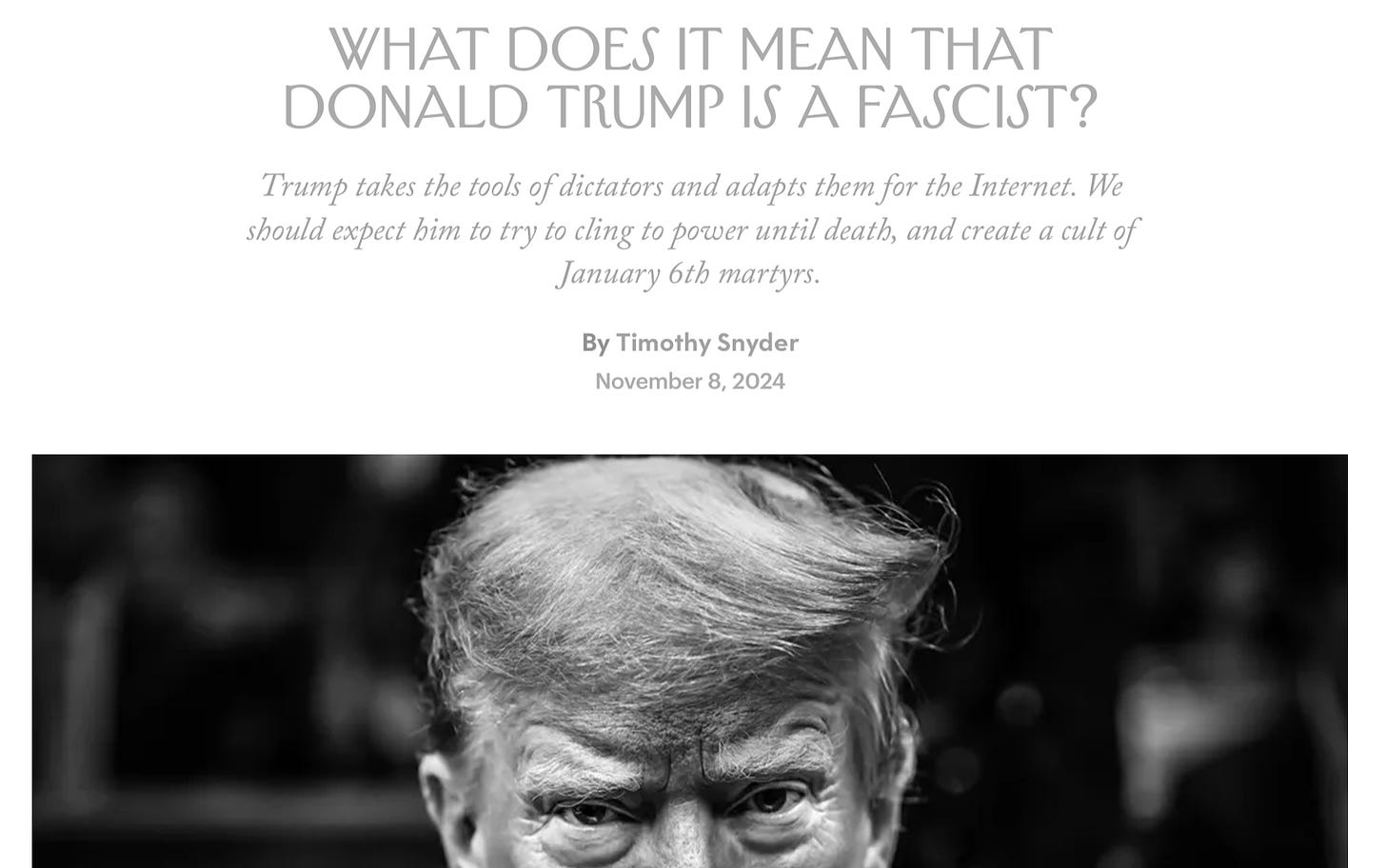
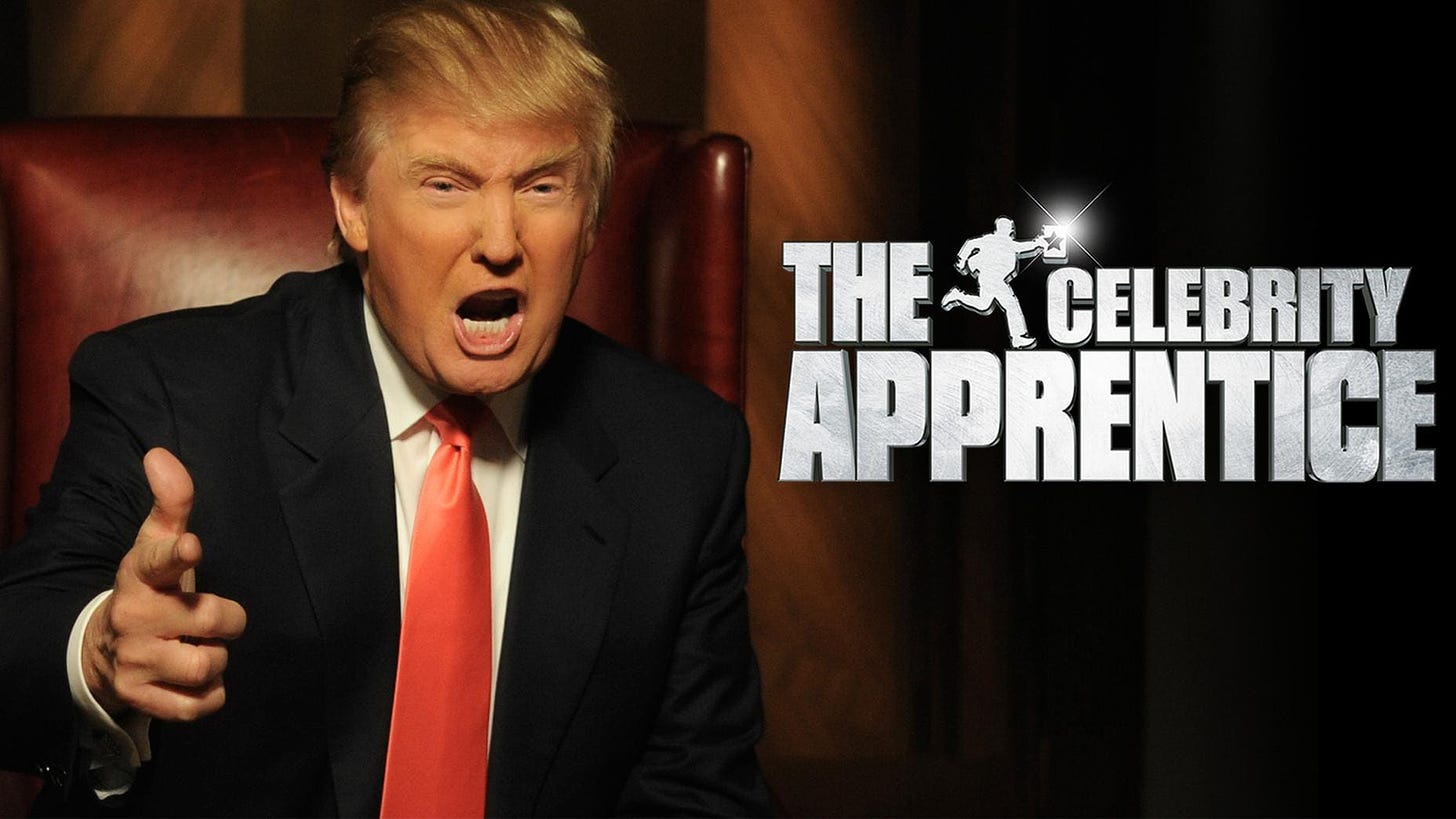

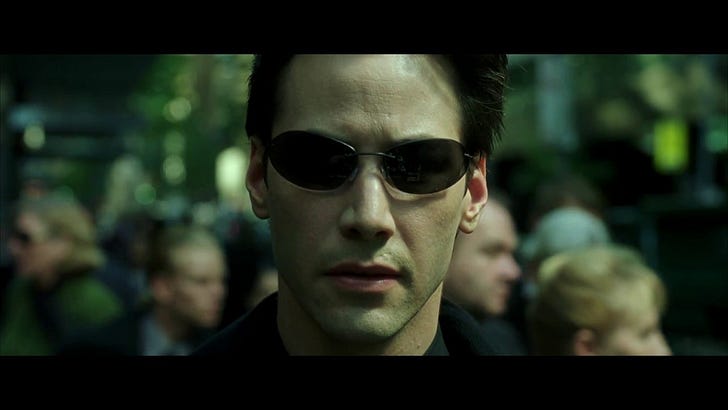

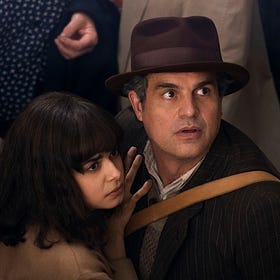

Keep spitting truth even if teeth come out sometimes with it
An informative article. Dealing with Trump is similar to dealing with climate change. People dislike bad news, but many folks will have to retrofit their heads to face reality. The people most in need of retrofitting are the billionaires.